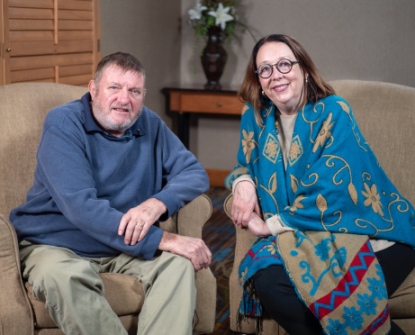Treating Severe Emphysema: One Family’s Journey with Bronchoscopic Lung Volume Reduction (BLVR)
Posted on October 29, 2020 |
This article was reviewed by Kristen Willard, MS
This post is based upon the real-life experiences of Chris, a person with COPD.

Emphysema – one of the forms of Chronic Obstructive Pulmonary Disease (COPD) – is a disease that affects the person with COPD as well as their family and caregivers who watch them deal with the frustration and fear of having difficulty breathing. Before emphysema affected Chris’s lifestyle, he enjoyed everything about the outdoors. He spent hours working in his garden and went hunting with friends. He absolutely loved fishing with his two grandsons, which involved a long walk through the woods to get to the river. As Chris’s symptoms progressed, he no longer found that long walk easy to do. He also had to pick and choose what he could do, as everyday activities became difficult for him to finish. Chris would have to form a plan to do just about anything, so that if he was out of breath, he knew there was somewhere for him to sit down and take a rest. He found this to be disruptive and embarrassing.
His wife, Jody, watched him struggle for years, which fueled her search for treatments that could help them get back some normalcy in their lives. She also felt a divide between their family and the rest of the world. Jody was devastated knowing that Chris felt that his problems became his family’s problems too. Chris was very good about using all his therapies and keeping up with the activities he learned at pulmonary rehabilitation. They wondered if there was more that could be done.
Chris’s medical care team agreed with Chris and Jody that it was time for him to be seen by a pulmonologist. The pulmonologist agreed with Chris’s COPD and emphysema diagnosis. Going further, he ordered more tests to get information on the location, type, and extent of Chris’s emphysema and found that he might benefit from a procedure called bronchoscopic lung volume reduction (or BLVR). During BLVR, valves are placed within the lungs that can help to move the air you breathe away from the more damaged parts of the lungs to healthier parts. This is done during a minimally invasive procedure called a bronchoscopy. Either of two FDA-approved types of valves can be used in the procedure by the treating physician.
On the day of the procedure, Chris was sedated (made sleepy). The physician placed a bronchoscope (thin tube with a camera) into Chris’s airways through his mouth. Then he could see the portion of Chris’s lung most affected by disease and place the small valves. After an overnight stay, Chris left the hospital with instructions on what he should do for the next few days and plans for follow-up.
Since Chris’s procedure, he and his family describe a changed world. Chris states, "The term life-changing comes to mind for me when I think about what this procedure gave me; I've gotten a lot back--I am even planning our first vacation in years and I am not having to plan out my breathing breaks." Chris has been able to maintain his growing garden with beautiful heirloom tomatoes and blooming flowers. He is able to spend time with his grandsons again and enjoy his life with Jody. The procedure brought an improvement in Chris’s quality of life, as well as Jody’s life and relationship, by relieving a lot of the concern, worry, and fear. Chris no longer had to have emphysema play such a large role in his life and is able to do certain things he loves to do again.
To learn more about Chris and Jody’s story, watch the full video and visit https://svs.olympusamerica.com/prescriptive-information to learn more about this endobronchial valve.
This post was sponsored by Olympus.